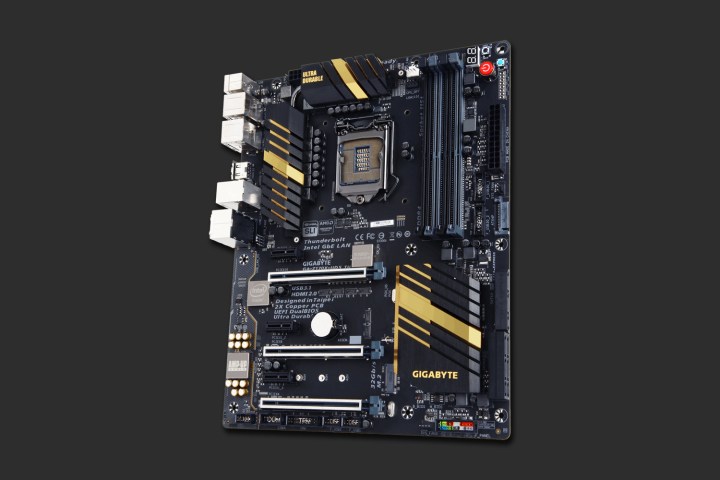
What makes Thunderbolt 3 a worthwhile piece of technology is support for dual 4K displays running at 60 frames per second, or a single 5K display, and Power Delivery 2.0 for up to 36W. There are two USB Type-C ports installed on this particular motherboard. These ports are capable of achieving data speeds of up to 40 gbps, which is twice as fast as Thunderbolt 2. Compare that to USB 3.0, which is impressively fast in its own right at 5 gbps, and there’s a massive difference.
Aside from the two Thunderbolt 3 over USB Type-C ports, this motherboard also features HDMI 2.0 output for onboard graphics, four fast PCIe 3.0 ports for installing GPUs and other devices, and support for 2-Way SLI or 3-Way CrossFire. For storage, there’s 3 SATA Express connectors that promise data transfer speeds of up to 16gbps.
Users will also find 115dB SNR HD audio, LED path lighting along the board for a little extra visual style, high quality metal-plated sockets and ports, and pretty much all of the standard features we’ve come to expect from a high-end motherboard.
As one would expect, this new motherboard supports 6th-generation Intel Core processors, which is the way most new boards are going, with Intel moving new computers towards its latest chipset. Along with this, the latest DDR4 RAM with 4 DIMMs is on the Z170X-UD5 TH.
As of this writing, Gigabyte didn’t announce pricing or release information for the Z170X-UD5 TH board, though based on specs, it’s clearly going to sit on the high end of the spectrum.
Editors' Recommendations
- The best motherboard for the Ryzen 7 7800X3D is cheaper than you think
- Gigabyte releases a strange driver for AMD Ryzen 7 5800X3D
- USB-C vs. Thunderbolt 3
- Microsoft says Thunderbolt 3 is not safe for Surface products
- This $700 laptop has Thunderbolt 3, and that’s great news for the future of PCs


